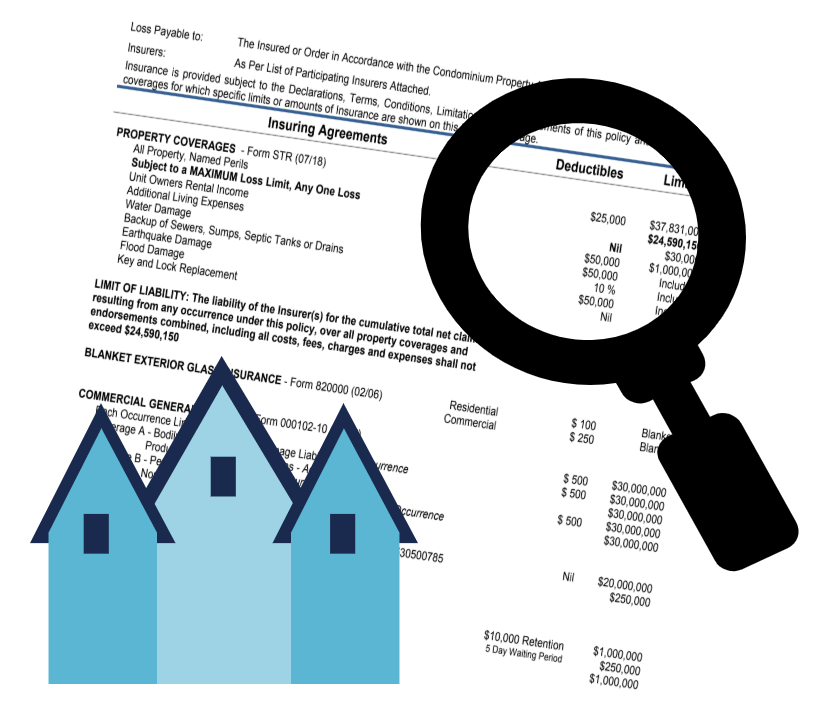BC Strata Insurance Increase
How Insurance Changes Affect YOU
There has been a lot of discussion and news on strata insurance in British Columbia, skyrocketing insurance, and high deductibles, and as a result of that I’ve been receiving a lot of questions.
This blog discusses the basics of condo insurance, what it is, and how the deductible plays in to all of this.
I also go in to detail about how this affects home owners and buyers both with regards to maintenance fees, potential special levies, and ability to obtain additional insurance.
For your need-to-know information about the BC strata insurance rates rising, keep reading!
What is condo insurance?
Due to the nature of strata properties, you are in a building or complex that has certain items or areas that are shared; also referred to as “common property.” Some examples of common property would be the lobby, elevators, gym, or other recreational facilities that unit owners share the expense of maintaining via their monthly maintenance/strata fees. Common property can be further reduced to “limited common property,” which is still under the governance of the strata but is used for the exclusive right of the homeowner. An example of limited common property would be a balcony, storage locker, or parking stall.
Because of these shared spaces, the strata corporation for condos specifically (but also townhomes) have an existing policy in place that covers certain things that are the responsibility of the strata. Strata Insurance typically has coverage for the following items:
- The buildings and structures shown on the condominium or strata plan and declaration
- Common property or elements such as hallways, stairs, roof, pools, garages, driveways, etc.
- Fixtures built or installed as part of the original or standard construction such as floor and wall coverings, and electrical and plumbing fixtures – some corporations have specific definitions for what is considered an “original” or “standard” unit
- Assets such as lobby furniture, building maintenance equipment, etc.
- Liability of the condominium or strata corporation for claims of property damage and bodily injury suffered by others
However, it’s also important that you obtain your own home insurance to protect your personal belongings, the unit itself, and cover any improvements after a renovation. You also want protection for unexpected events like if you damage another unit (ie your dishwasher leaks in to another unit) or if someone injures themselves inside your condo.
This strata insurance for the building is paid via the operating budget; which is funded by the monthly maintenance fee contributed by each owner of the building/complex. Therefore, if condo insurance increases it is very likely that homeowners will see a rise in their maintenance fees or a large special levy to offset the costs.
Increases in BC Strata Insurance Premiums & Deductibles
With up to an estimated 10,000 strata corporations across the province to be impacted by the insurance rate increases, all strata home owners in BC must brace themselves.
While most people are used to seeing their insurance premiums go up every year, the strata market right now is especially tough and falling in to more of a hard market; which means guidelines are getting tougher and rates are rising.
Right now we’re seeing this in two ways:
- Premiums are increasing
- Deductibles are rising
What we’ve seen in the past few years is a ton of water damage in these stratas, and at the end of the day the insurance companies are backing out of multi family and saying that it is no longer profitable for their business. At this point, we’re pretty much working with 3 main insurers: Hub, CapriCMW, and BFL.
What’s happening is premiums are sometimes up to triple as high as they were beforehand; and while normally you see your deductible somewhere between $5,000 to $25,000, those have increased to $100,000-$200,000 consistently and I’ve even seen as high as $600,000.
Because of the insurance is paid as a part of the operating budget by the strata, these increased costs are only able to be funded by large special levies by the owners, borrowing against the contingency fund, or significant increases to maintenance fees… or even worse, all of the above.
This also affects landlords and tenants alike, as if a unit is rented this increase in cost to the landlord will likely result in a max increase in rent due by the tenant. However, it is likely that the landlord is as greater risk and will have a tough time passing this onto the tenants entirely, especially since rent increases are capped each year with relation to CPI.
Deductibles Explained
While some people may be able to swallow a tough pill and budget for a premium increase, it’s the deductible that’s throwing many for a loop.
So what is a deductible? Whenever there is a claim on a strata corporation policy, the deductible works just like a car deductible with ICBC – if the amount of damage is greater than the deductible then you make the claim, pay the deductible, and repairs proceed. However, for a strata, when this occurs it is up to the council to determine how they will pay for or recover the deductible amount on behalf of the strata. There’s a couple things the strata needs to consider with regards to this matter:
- Was the damage the result of a common property issue that would fall under the responsibility of the strata?
- Should the strata pay via the contingency?
- If there’s not enough in the contingency should they levy all owners?
- Is it actually a particular owner’s fault and responsibility, which would result in a chargeback?
If the strata is deemed responsible but doesn’t have enough money in the contingency to pay for the deductible, it will still affect you as a homeowner. Why? Because they’ll be forced to call a special general meeting and impose a special levy, in which all unit owners contribute based on unit entitlement to cover the cost.
In the event that an owner is deemed responsible for the claim, then that is when the owner’s personal home insurance would kick in to cover the deductible – BUT, this is also a concern for you due to limited amount of options for coverage of high deductibles.
THIS is where issues really start to kick in with regards to deductibles, because many home insurers on a personal level will not insure over $150,000. Therefore, if the deductible is increased from $25,000 to $300,000 (as we’ve seen in some cases), then the homeowner may be on the hook for the difference. It would go a little something like this:
- The strata deductible is $300,000
- The homeowner is deemed responsible for the damage caused
- The homeowner’s personal home insurance policy only insures up to $150,000
- The homeowner is on the hook for the difference between their insurance and the deductible; which means they have to pay $150,000 out of pocket
- The homeowner probably has to sell their home, set up a payment plan, or re-finance… unless they have $150,000 sitting around
If an owner is responsible for the claim and they do not have insurance, cannot afford to pay the amount, or refuses to pay the amount, the strata corporation may file a claim with the Civil Resolution Tribunal to obtain a judgment for the amount.
At this point, all of the issues with regards to deductibles are unprecedented in BC. There will be some homeowners who, because the premiums are getting so high, won’t or can’t have insurance on their units, and at some point I anticipate that the government will step in and put a cap on deductibles as this has already been done in other provinces.
I highly recommend all owner, landlords and tenants purchase insurance for their strata lot/condo. Bring a copy of your current strata policy to your broker to determine your risks such as deductible amounts, exemptions, and what insurance is available.
Is it possible for strata’s to be denied insurance?
Insurers are being so picky about their risk exposure that some poorly maintained or older strata face losing their insurance coverage entirely. This would mean that not only would owners lose everything in a major event such as a fire, flood or earthquake, but also they would not be able to sell or remortgage their homes, even if there was no such catastrophe.
Many buildings have also experienced issues with regards to renewing their policy, specifically those in high-density areas or that have a number of water damage claims in the past; and either being denied coverage or only a short-term extension leaving homeowners completely on the hook and in an uncomfortable situation.
In some cases, stratas will have multiple insurance agencies come in and each agency only takes on a fraction of the building. Even then, stratas are sometimes not able to get 100% coverage.
How will this affect real estate prices?
Lenders may decide not to offer mortgages to buildings who have high deductibles, and buyers will choose not to buy into those buildings. Those who understand the insurance will opt for the buildings with the lower deductible, or opt to not get into the market at all as it can be quite unpredictable. One building may have a good track record, but as soon as an incident occurs, it may skyrocket.
One would assume this should impact the demand for condos, however, as of right now markets are completely ignoring the news. Many Condos are fetching multiple offers and prices are inching higher. Supply has dwindled to just 3 months of inventory for sale. Will the market finally catch on? Will the BC Government be forced to intervene? I’m interested to see how the spring market plays out amidst all of these strata issues and coronavirus. Stay tuned…
—
Looking to buyer or sell real estate in the Greater Vancouver and Fraser Valley areas? Start a conversation with a realtor from Bridgewell Group by calling or texting 604-319-2020 or email [email protected] to talk to a realtor about buying or selling in the Greater Vancouver area today.




